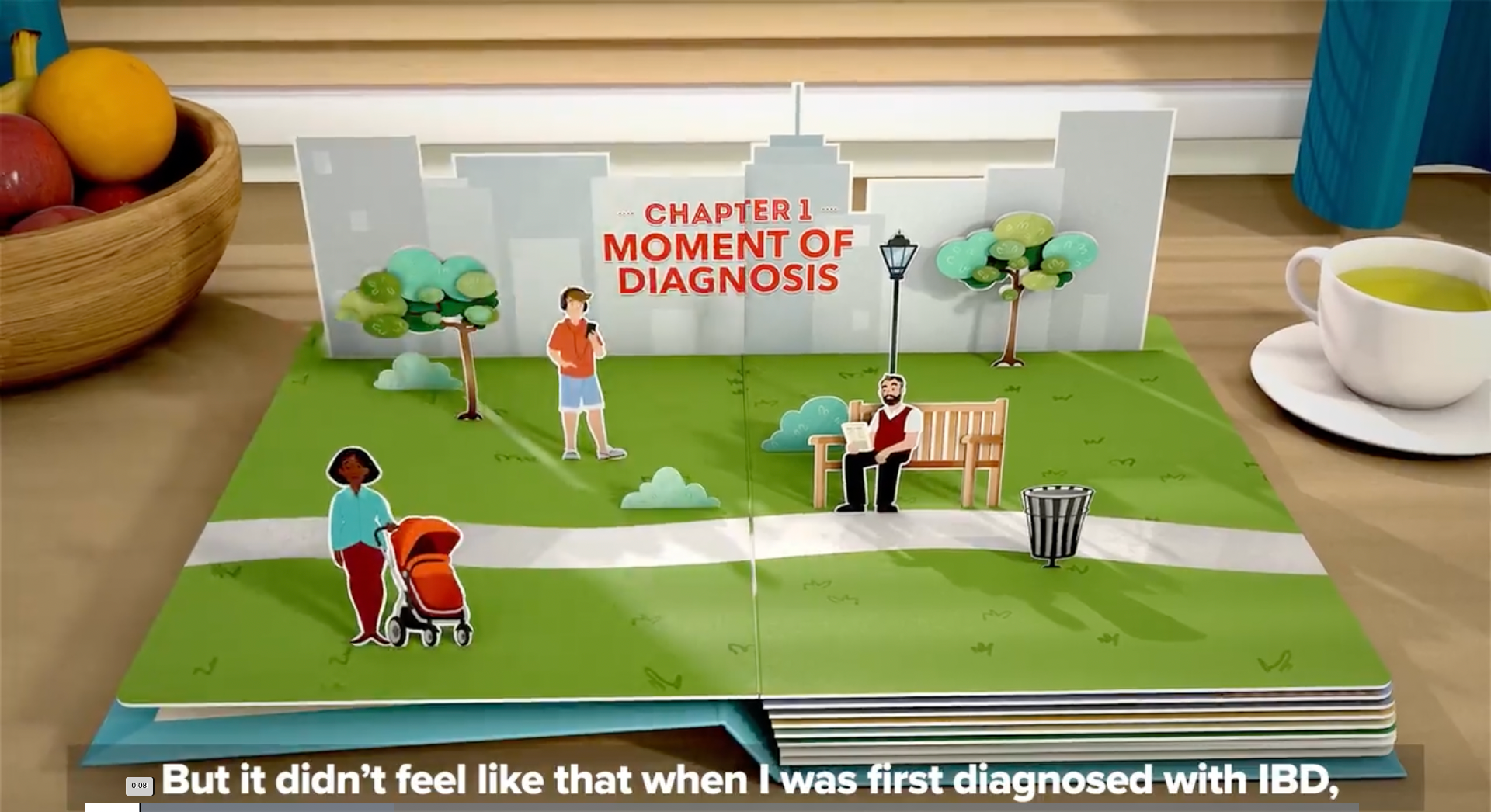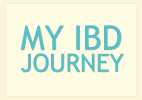Inflammatory Bowel Disease

Inflammatory Bowel Disease (IBD) can have a significant impact on your life – from both a physical and emotional perspective. What symptoms do you get? How can you relieve them? How do you handle these new emotions? How can your friends and family help? How can you continue to do the things you love? In this section, you will find practical tips and advice to help you cope with the condition and its symptoms.
Whilst it may not feel like it at the start, with a bit of planning and recognising your own triggers, you can still achieve your goals and live life to the full. No two people with IBD have the same experiences, but these tips should be a good starting point on your personal journey to living the life you want. You do not have to let a diagnosis of IBD prevent you from achieving what you want to achieve. Many extremely successful people have or have had IBD and some of the most powerful and influential people in the world have IBD.
Making the most of your appointments
Before your appointments
- Write down any questions you have as you think of them and take them with you to your appointment
- You could ask a family member or friend to come with you to your next appointment. Perhaps they can take notes while you talk to the doctor
- You may find it useful to write down your symptoms on a daily basis – below is a diary that can help you track these and if you feel comfortable to, this could be taken to your appointments

During your appointments
- Make sure you share your questions with your doctor at the start of your appointment. Don’t wait until the end, when the doctor has run out of time. Ask the questions, or bring up the topics that are worrying you the most at the beginning of the appointment to ensure they are covered; and if you didn’t have time during the appointment to talk about everything, don’t be afraid to ask if you can email them afterwards
- It can often be difficult to remember everything that is said during an appointment. You might want to write down what your doctor says so you can refer to your notes afterwards, or even record the appointment (with your doctor’s permission)
- You might not know all of the medical terms mentioned during your consultation or treatment. If there’s a word you have not heard of before, ask the doctor or nurse to explain it
- Don’t be afraid to ask for further referrals to other healthcare professionals or specialists (e.g. dietitian, counsellor) or when your next scheduled appointment is if you feel you aren’t seeing your doctor regularly enough
Suggested questions/conversation starters
The list below includes example questions to help start a conversation with your doctor. There may be other relevant questions based on your symptoms, stage, and medical history that are not listed here.
- Could any condition other than my IBD be causing my symptoms?
- How will I know if my medication needs to be adjusted?
- Approximately how long should it take to see some results, or to find out that this may not be the right medication for me?
- If my medication doesn’t work, what are the other treatments available to me? What are the potential side effects of the medication?
- What symptoms are considered an emergency?
- Should I change my diet or take nutritional supplements? If so, can you recommend a dietitian or any specific nutritional supplements?
- Will I eventually need to get surgery?
- Are there lifestyle changes I can make to help with my treatment?
- What about my future? What will my condition be like when I’m older?
- Does IBD affect pregnancy and my ability to have children?
- I’m feeling anxious and overwhelmed about my life – can you recommend ways to address this or any specialists/support groups I can speak to?
- I’m having trouble with some of the symptoms, particularly fatigue, as this is preventing me from working/looking after my family – can you recommend ways to tackle this or any further specialists/support groups I can speak to?
Getting familiar with your healthcare team
After being diagnosed with IBD, it’s important to remember you are not alone. Apart from family and friends, your healthcare team and patient advocacy groups are available to help with all aspects of the condition.
Your IBD team is a multidisciplinary team designed to work together for your wellbeing. Understanding your disease and their role can help you prepare specific questions you might want to ask during your treatment visits.
Below is a list of healthcare professionals you’re likely to speak with at some stage in your treatment journey:
- Consultant Gastroenterologists: Diagnose the signs and symptoms of digestive diseases
- Surgeons: Perform a variety of procedures used to repair damage caused by disease
- IBD Nurse Specialists: Provide specialist care, procedures, education and support to patients
- Psychologists: Support in the management of mental wellbeing and the emotional side of IBD
- Dietitians: Devise diets to compensate for nutrient deficiencies and help manage the symptoms of IBD
Managing symptoms
IBD affects people in many different ways, and symptoms vary depending upon which part of the digestive system is inflamed. But the true impact of IBD goes much further the debilitating effects of IBD: stigma, isolation, decreased productivity and psychological issues often affect people with this condition. Below we focus on some of the main areas people with IBD struggle with – please also see the ‘My IBD Journey’ resource below which is a video series with helpful advice and useful tips to help you manage your condition. Remember to keep talking to people and let others learn with you – although it won’t feel like it at the start, with a bit of planning and recognising your own triggers, you can still achieve your goals and live life to the full.
If there has been a sudden change in your symptoms or you feel you can’t manage, always talk to your doctor to get advice.
Mental wellbeing
For a long time, researchers suspected that psychological factors could be a trigger for IBD. Today we know that there is no direct connection between the onset of the disease and persistent psychological stress. However, stress factors may have an influence on the course of the disease.
Living with a life-long and often painful condition like UC or CD can trigger fear and worry and increase your levels of stress about all different types of practical issues. You may, for example, worry about how to tell people around you about your condition. Telling your friends or colleagues about your illness may not seem easy. Overthinking your situation for a long period of time may at times affect your mood and make you feel anxious or even depressed. Depression does not simply involve feelings of sadness; it is a complex condition with many symptoms. These can include:
- Feeling really down for more than a few weeks
- Losing interest in things you used to like
- Feeling empty and isolated, ‘not good enough’ or like the world would be better off without you
Whilst coming to terms with a diagnosis of IBD may not be easy, it is important that you understand that you are not alone, and that there are many people like you out there, as well as multiple associations, health institutions and networks that can
offer advice and help you when you may feel you are struggling. Connecting with others in the same situation as you, who understand you, sharing your emotions and getting involved can really change your outlook on your IBD. Simply listening to someone who has the same condition as you can be reassuring.6
To find out about local communities and patient associations that can help, please see here.
Diet
One of the most important steps you can take is adjusting your diet in order to find out which foods trigger flare-ups and you’ll need to avoid. It’s important to avoid gassy foods, only eat a moderate amount of fibre, and avoid large meals.7 You should also pay attention to what you eat before experiencing a flare-up so you can recognise your trigger foods. These will vary per person and will take some time to determine. Try keeping a journal of everything you eat and talk to a dietician about alternatives if you’re unsure.
Relationships8910
One of the biggest issues that those living with IBD can face is the fear of becoming socially isolated.8
Remember you are not alone and in addition to connecting to local communities and patient associations, your family and friends want to help and support you. Let them learn with you and don’t feel guilty if your plans need to change – do what is right for you and your family and friends will understand and will want what is best for you. Below are some helpful tips, as well as our LEXICON which may help with starting difficult conversations.
Friends and family
- Speak to family and friends – being open about your problems can help them understand
- Explain that plans may need to be cancelled last minute. Not everyone will always be understanding, but it is important that you prioritise your health. You should not feel guilty if you need to leave early or even not attend at all
- Your friends may have questions that seem strange, but accept that people without IBD don’t know much about it
- They might also make silly suggestions, or tell you things you already know. Remember that they are trying to help, so simply explain that you are managing your condition and that you understand what works best for you
Intimate relationships
IBD can get in the way of intimate relationships. Here are some tips to help you manage the situation a little better:
- Be honest with your partner: Openly communicate your feelings. Explain the emotional and physical impacts of IBD, and how this can impact intimacy
- It may be helpful to explain that sometimes there is a disconnect between how you feel emotionally and how you feel physically
- Be prepared for some difficult conversations; not all potential partners will understand your apprehensions. You may have to decide whether or not that person is right for you
More information can be found on the websites listed in the relevant section on our ‘useful websites’ page.
Becoming more independent
Living with IBD can make the thought of leaving the house — whether for work, education, or even just to go to the shops — a little daunting. There are a number of things you can do to help reduce stress and anxiety, enabling you to be more confident when out in public for long periods of time, or even to take a holiday! IBD shouldn’t stop you from doing the things you like.
Leaving the house11
Pack some supplies: IBD can be unpredictable at times, which means uncomfortable symptoms can occur unexpectedly. Make a ’just in case’ kit for those emergency moments. Items you might want to consider packing include:
- Toilet paper or wet wipes
- Antibacterial hand gel
- Clean underwear
Work and education11
- Employers and educational establishments have a responsibility to try to accommodate any reasonable health-related requests. If you are a student, you might find it useful to let your teachers or student services know about your requirements. Similarly, if you are in employment, you could inform your line managers or human resources. In each case, they may be able to make provisions for flexible working arrangements, deadline extensions etc.
- If you are in an office, see if you can be seated in an area with easy access to the bathroom, or sit near the door of your lecture theatre/classroom
For many people, work is an important part of life, and your IBD shouldn’t stop you continuing your education or career or having the job you want.
Travelling12
- When travelling abroad, use only bottled water for drinking, brushing your teeth and washing food
- Avoid ice cubes in drinks, as these are often made with local water supplies
- Avoid all street food
- Do not eat any raw or undercooked foods
Fatigue13
Extreme fatigue is a common aspect of living with IBD. Although it may not be apparent to others, it can have an enormous impact on all aspects of your daily life, including work, education, socialising and relationships. It is important to ensure you are getting enough sleep and making time to rest and since fatigue isn’t visible, you’ll have to communicate with your friends and family about how you feel. Sometimes, you’ll need to leave gatherings early or decline invitations altogether. Over time you’ll learn how much you can handle and eventually, you’ll become an expert on budgeting your time.
The following points might be useful if you are prone to periods of fatigue:13
- Identify your warning signs: Learn how to recognise oncoming fatigue and be sure to take the time to rest
- Take holidays! Many people living with IBD say that even a short relaxing break can restore energy levels and make them feel more positive – both emotionally and physically
- Reserve energy: Save your spare time for things you enjoy and plan your agenda according to your needs
- Find exercise that works for you: Exercise is important for your overall wellbeing and may help you manage your IBD. If you feel well enough, you could explore gentle exercise such as yoga or light swimming, before attempting more rigorous activities
- Eat healthily: Like exercise, eating well is an important part of managing your IBD. You can make things much easier by planning meals in advance, cooking multiple portions and freezing meals so that good food is always on hand
- Get enough sleep: It is important that you get a good night’s sleep on a regular basis. Not getting adequate rest will make you feel run down and may cause flare-ups, or make them worse.
Pregnancy14
If you have IBD, it’s important to consult your doctor as soon as you decide that you’re going to try and get pregnant, so they can determine the best treatment and management plan for you. While some medications are considered safe during pregnancy, some should be avoided, so it’s a good idea to discuss this carefully with your doctors. They will give you advice on staying healthy during pregnancy and answer any questions you have about how IBD might affect a pregnancy. Local patient associations also provide support when you’re preparing yourself for parenthood.
According to available research, if you have mildly active or inactive IBD when you become pregnant, it is unlikely to get worse in pregnancy. If you become pregnant while your disease is active, it is more likely to remain active during your pregnancy.
If you are pregnant and have IBD, it’s important to take regular breaks – pregnancy can be tiring and IBD can add to this, so making time for rest is important.
Also remember to keep in touch with your doctor – if you have questions about your treatment during pregnancy/breastfeeding (not all treatments can be taken when breastfeeding), before considering stopping your medication, make sure you speak to your doctor first. They are also there to help with any worries or concerns you have so don’t hesitate to lean on them more at this time if you need to. Your doctor will be able to discuss your personal circumstances and help you cope during pregnancy and once the baby arrives.
And lastly – don’t forget to lean on your support network - having a good support network in place is important both during your pregnancy and when the baby comes, as well as not putting too much pressure on yourself to be the ‘perfect parent’. Seek additional help if you need it; remember that stress can cause IBD flare-ups.1516
Remember - most people with IBD who want to have children go on to have a healthy pregnancy and healthy baby.14
Stay healthy, stay informed
It’s only natural to feel uncertainty and have negative emotions after you are diagnosed with IBD. You may feel confused, anxious, depressed or even angry, and may want to withdraw from people. This does not always happen, but feelings like these are only human. Your situation is complicated, and everyone reacts in their own way.
If you are anxious about your illness or treatment, do not hesitate to talk to any of the healthcare professionals taking care of you. As the saying goes: knowledge is power. The more information you have, the more in control you will feel. And you will then be in a better position to make informed decisions. Whilst it may not feel like it at the start, with a bit of planning and recognising your own triggers, you can still achieve your goals and live life to the full.
Tips to help you stay in control
Keep a diary
Keeping a diary helps you get a handle on your feelings, as well as identify your triggers. It’s also helpful for any medical appointments to enable you to discuss any symptoms or side effects you have been experiencing.
Reach out to support groups
You can join a support group to share your experiences with people in the same situation.
Click here for more details
Talk to family and friends
They can be a fantastic source of support, both practical and emotional.
Talk openly
Try to be as open and honest as you can be with your loved ones about your condition, treatment and worries. The better they understand, the more they can support you.

Ask for help
Living with IBD and managing its various symptoms can be an exhausting experience. Don’t be afraid to ask family, friends, or support groups for help.
Talk to your doctor
They are used to the questions and doubts that you have. They can also be a real source of support.
Set your own pace and goals
Take each day as it comes. Focus on what you can control here and now, and on your current quality of life rather than on unknowns.
On good days you can set small goals or realistic tasks and celebrate those small wins: going for a walk, calling a friend for a chat. Make a list of things you want to achieve – both short and long term and each day, you can tick off what you have managed to do. You can save what you were not able to do for tomorrow. Above all, try not to make too many changes to your life at the same time and don’t look back – you may feel that you can’t continue doing some of the things you used to, but with a bit of planning and recognising your triggers, you can still achieve your goals and live life to the full.
Watch out for symptoms of depression
It is important to recognise when your stress or negative feelings are turning into depression. If this happens to you, you must talk about it with your doctor. They may refer you to a psychologist or psychiatrist who can help you.
Some signs of depression are:
- You find it hard to sleep
- You are unable to concentrate
- You lose interest in most activities
- You regularly feel low
If you’re depressed, let people know why. Some friends or family members may not understand why you feel depressed. Keep being open and honest with them and encourage them to take the same approach with you.
Stay positive
Keeping a positive mindset can be difficult, especially on a bad day, but many people with IBD lead happy and productive lives and always remember, there are simple steps you can take to help manage the condition. If, however, you feel you’d like help with maintaining a positive mindset or outlook on life, see our ‘useful websites’ [hyperlink] page for links to other organisations you may find useful and here for tips from others like you:

My IBD Journey offers guidance on how to plan and manage the range of symptoms you may encounter as an individual living with Inflammatory Bowel Disease (IBD), allowing you to live your life to the fullest.
